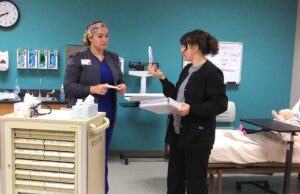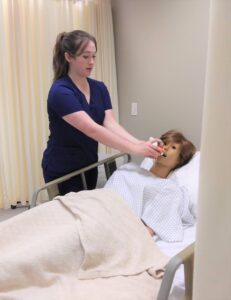Certified Medication Technician
The Certified Medication Technician course is non-ABHES accredited.
1 Day of Seated Class per Week • 10 Weeks to Certification
The purpose of the Certified Medication Technician (CMT) training program is to prepare individuals for employment as a CMT in an intermediate care or skilled care nursing facility. The program is designed to teach skills in administration of non-parenteral medications that will qualify students to perform this procedure to assist licensed practical nurses or registered professional nurses in medication therapy.
The course consists of at least 60 classroom hours of instruction on BTC Campus and a minimum of 8 hours of clinical practice under the direct supervision of an instructor. The classes are 1 day a week for 10 weeks. The class consists of instruction in these areas; basic review of body systems and medication effect on each system; medical terminology; infection control; and medication classifications.
An individual must successfully complete a final written examination and a minimum 2 hour final practicum exam before a certificate can be issued. After successful completion of the written and practicum exam, the individual’s name will be placed on the Missouri Department of Health and Senior Services Certified Medication Technician (CMT) Registry.

Certified Medication Technician Statistics
- Spring '22 Job Placement Rate
- 100%
- Teacher to Student ratio
- 1:6
- Spring '22 certification completed
- 100%
- hours of classroom & on-the-job training
- 68
What You’ll Learn
Unit 1: Role of a Medication Technician, Long Term Care Team, State and Federal Controls
Unit 2: Medication Terminology, Abbreviations, Dosage, Measurements, Drug Forms, Transcribing Physicians’ Orders Packaging, Storage, and Accountability
Unit 3: Body Systems, Intro to Pharmacology, Observing and Reporting
Unit 4: Basic Guideline, Special Categories of Drug Administration, Prepare and Administer Medications
Helpful Links
Downloads
Prerequisites
- None
Requirements for Program
- 18 years of age or older
- High School Diploma or GED
- CNA license and employment for 6+ months
- Satisfactory Background Screening with Missouri DHSS
- 100% of tuition paid before start date
- Letter of recommendation from your Director of Nursing
Why BTC?
We’re a small school with small class sizes, close to home, and where everyone really does know your name. At some larger schools, you’re stuck in giant classrooms with an impersonal atmosphere and no help in sight, but at BTC you’re a name, not just a number.
Help is always available and our staff and faculty bend over backward to help out with whatever you’ve got going on as we help you navigate the waters of your program.

Student Story
“My job offered me the opportunity to take [the BTC CMT course] and I accepted. This program was a great way to further my education in healthcare as I push toward my goals. I hope to work as a CMT while in nursing school with this extra knowledge provided by taking this course.”
-Jillian Switzer, Spring 2022 CMT grad
Program Details
CMT Certificate Program
The purpose of the Certified Medication Technician (CMT) training program is to prepare individuals for employment as a CMT in an intermediate care or skilled care nursing facility. The program is designed to teach skills in administration of non-parenteral medications that will qualify students to perform this procedure to assist licensed practical nurses or registered professional nurses in medication therapy.
The class consists of instruction in these areas: basic review of body systems and medication effect on each system, medical terminology, infection control, and medication classifications.
CMT Program Length: 10 weeks (One day per week for 10 weeks) 8AM-4:00PM
Program Objectives
- Become competent with medication terminology and abbreviations
- How to transcribe physician orders
- Learn the correct way medication is packaged, stored, and your role in accountability
- Anatomy and Physiology
- Introduction to pharmacology and different classification of medications
- Preparing and administering medications specific to the CMT role: oral, ophthalmic (eye), optic (ear), topical, transdermal, oral, nasal, vaginal, rectal, oxygen
Employment Opportunities
- Hospital
- Home Health
- Nursing Home
- Clinic
- Most Medical Facilities
